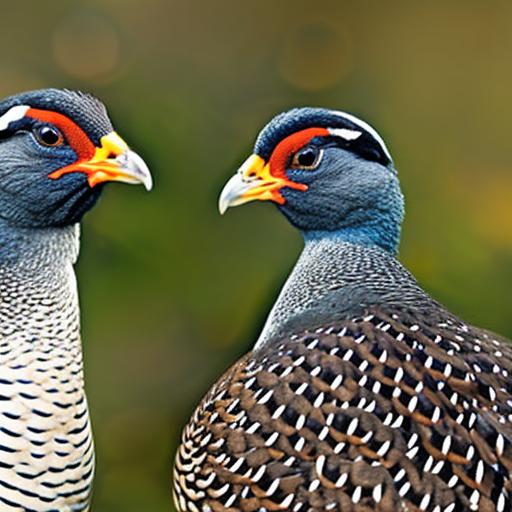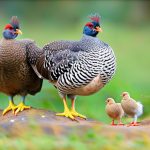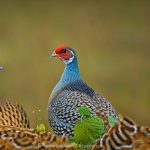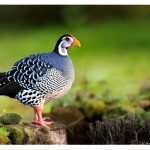Guinea fowl, like many other poultry, have specific needs when it comes to surviving in cold weather. Understanding these needs is crucial for ensuring the health and well-being of your guinea fowl during the winter months. Firstly, guinea fowl require a dry and draft-free shelter to protect them from the harsh elements. They are susceptible to frostbite, so it’s important to provide them with a warm and cozy environment. Additionally, guinea fowl need access to fresh water and high-quality, high-calorie feed to help them maintain their body temperature and energy levels. It’s also important to protect them from predators, as they may become more vulnerable during the winter when food is scarce.
Guinea fowl are hardy birds, but they are not as cold-tolerant as some other poultry species. They are native to warmer climates and can struggle in extreme cold. Therefore, it’s essential to provide them with the necessary resources to help them cope with the winter weather. By understanding their specific needs, you can ensure that your guinea fowl stay healthy and happy throughout the colder months.
Key Takeaways
- Guinea fowl need protection from cold weather due to their low tolerance for freezing temperatures
- Proper shelter for guinea fowl in winter should be well-ventilated, dry, and free from drafts
- Access to fresh, unfrozen water is crucial for guinea fowl in freezing temperatures
- High-quality, high-calorie feed is essential to help guinea fowl maintain their body temperature in winter
- Protect guinea fowl from predators in winter by securing their shelter and using deterrents
- Regularly monitor the health of guinea fowl for signs of cold-related illnesses
- In extreme cold, consider additional measures such as heat lamps or heated waterers to keep guinea fowl warm
Providing proper shelter for guinea fowl in winter
When it comes to providing shelter for guinea fowl in winter, there are a few key considerations to keep in mind. Firstly, it’s important to ensure that their shelter is dry and draft-free. This will help prevent frostbite and other cold-related health issues. Insulating the shelter with straw or hay can also provide additional warmth for the birds. Additionally, providing roosting bars or platforms can help keep the guinea fowl off the cold ground and away from any dampness.
It’s also important to make sure that the shelter is well-ventilated to prevent the buildup of moisture, which can lead to respiratory issues. However, it’s crucial to strike a balance between ventilation and insulation to keep the birds warm without exposing them to drafts. Lastly, providing nesting boxes filled with straw can give the guinea fowl a cozy place to lay their eggs and seek refuge from the cold. By providing proper shelter for your guinea fowl in winter, you can help them stay comfortable and healthy despite the harsh weather conditions.
Ensuring access to fresh water in freezing temperatures
Access to fresh water is essential for the health and well-being of guinea fowl, especially in freezing temperatures. However, keeping water from freezing can be a challenge during the winter months. There are several strategies you can use to ensure that your guinea fowl have access to water even when temperatures drop below freezing. One option is to use heated waterers specifically designed for poultry. These devices are equipped with a heating element that prevents the water from freezing, ensuring that your guinea fowl always have access to fresh water.
Another option is to manually refill water containers multiple times throughout the day to prevent them from freezing. This requires vigilance and dedication, but it can be an effective way to ensure that your guinea fowl stay hydrated during the winter. Additionally, adding a small amount of apple cider vinegar to the water can help prevent freezing by lowering its freezing point. By taking proactive measures to ensure access to fresh water in freezing temperatures, you can help your guinea fowl stay healthy and hydrated throughout the winter months.
Offering high-quality, high-calorie feed for guinea fowl during winter
During the winter months, it’s important to provide guinea fowl with high-quality, high-calorie feed to help them maintain their body temperature and energy levels. Cold weather increases the birds’ energy requirements as they work harder to stay warm. Therefore, it’s crucial to offer a feed that is rich in nutrients and calories to support their increased energy needs. Look for feeds specifically formulated for poultry in cold weather, as these will often contain higher levels of protein and fat to help keep the birds warm.
In addition to a balanced feed, you can also supplement their diet with treats such as mealworms, sunflower seeds, or cracked corn. These treats are high in calories and can provide an extra boost of energy for the guinea fowl during the winter months. It’s important to monitor their body condition and adjust their feed accordingly to ensure that they are maintaining a healthy weight. By offering high-quality, high-calorie feed for your guinea fowl during winter, you can help them stay warm and energetic despite the cold weather.
Protecting guinea fowl from predators in winter
Predators pose a significant threat to guinea fowl year-round, but they may become even more desperate for food during the winter months when their natural prey is scarce. It’s important to take extra precautions to protect your guinea fowl from predators during this time. Firstly, ensure that their shelter is secure and predator-proof. This may involve reinforcing doors and windows, as well as installing locks or latches to prevent unwanted entry.
Additionally, consider using motion-activated lights or sound deterrents near their shelter to scare off potential predators. Electric fencing can also be an effective way to keep predators at bay, especially if you have a larger property. It’s important to regularly inspect the perimeter of their enclosure for signs of digging or other attempts at entry by predators. By implementing these measures, you can help protect your guinea fowl from predators and ensure their safety during the winter months.
Monitoring the health of guinea fowl in cold weather
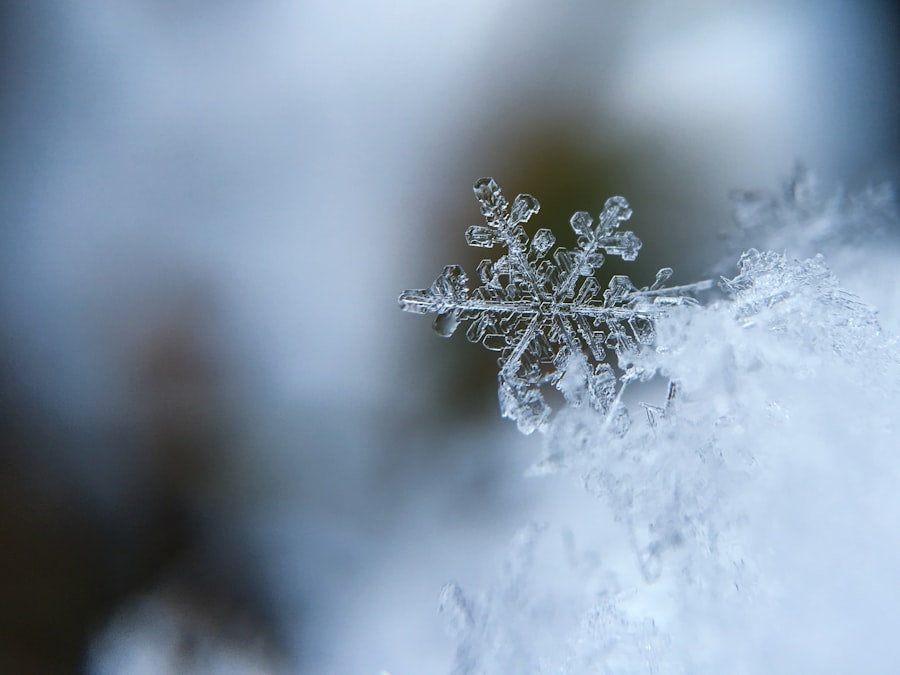
Monitoring the health of your guinea fowl is crucial during cold weather, as they may be more susceptible to certain health issues during this time. Keep an eye out for signs of frostbite, such as discoloration or swelling of the comb, wattles, or feet. If you notice any signs of frostbite, it’s important to take immediate action to warm up the affected areas and prevent further damage.
Additionally, be vigilant for signs of respiratory issues, which can be exacerbated by cold and damp conditions. Keep their shelter clean and well-ventilated to prevent the buildup of moisture and ammonia from their droppings, which can contribute to respiratory problems. Regularly check on your guinea fowl for any signs of illness or injury, and consult with a veterinarian if you have any concerns about their health. By monitoring their health closely and taking prompt action when needed, you can help ensure that your guinea fowl stay healthy throughout the winter.
Implementing additional measures to keep guinea fowl warm in extreme cold
In extreme cold temperatures, it may be necessary to implement additional measures to keep your guinea fowl warm and comfortable. One option is to use heat lamps or infrared heaters in their shelter to provide supplemental warmth. However, it’s important to use these devices with caution, as they can pose a fire hazard if not properly installed and monitored.
Another option is to provide extra bedding such as straw or hay in their shelter to help insulate them from the cold ground and provide additional warmth. You can also consider using insulated jackets or blankets specifically designed for poultry to help keep them warm during extreme cold snaps. Additionally, consider providing extra food during particularly cold periods to help them generate more body heat through digestion.
It’s important to be mindful of potential hazards when implementing these additional measures, such as fire risks or moisture buildup from excessive bedding. Regularly inspect their shelter and equipment to ensure that everything is functioning safely and effectively. By taking these additional measures when necessary, you can help ensure that your guinea fowl stay warm and healthy even in extreme cold temperatures.
In conclusion, caring for guinea fowl in cold weather requires careful attention to their specific needs and proactive measures to ensure their well-being. By providing proper shelter, access to fresh water, high-quality feed, protection from predators, and monitoring their health closely, you can help your guinea fowl thrive despite the challenges of winter. Implementing additional measures when necessary can also help keep them warm and comfortable in extreme cold temperatures. With proper care and attention, your guinea fowl can stay healthy and happy throughout the winter months.
When it comes to keeping guinea fowl in cold weather, it’s essential to provide them with a suitable coop. A well-insulated and well-ventilated coop can help protect guinea fowl from the harsh winter conditions. For more tips on creating the perfect coop for your guinea fowl, check out this informative article on large chicken coop ideas. It offers valuable insights into designing a comfortable and safe environment for your birds during the colder months.
FAQs
What is the ideal temperature for guinea fowl in cold weather?
Guinea fowl are able to tolerate cold temperatures quite well, but they should be provided with shelter and protection from harsh winds and wet conditions. The ideal temperature for guinea fowl in cold weather is above freezing, around 40-50 degrees Fahrenheit.
How can I keep my guinea fowl warm in cold weather?
To keep guinea fowl warm in cold weather, provide them with a well-insulated coop or shelter that is protected from drafts. Bedding such as straw or wood shavings can also help to provide insulation and warmth. Additionally, providing supplemental heat sources such as heat lamps or heated perches can help to keep guinea fowl warm in extremely cold temperatures.
What should I feed my guinea fowl in cold weather?
In cold weather, it is important to provide guinea fowl with a balanced diet that includes high-quality poultry feed, as well as access to fresh water and occasional treats such as fruits and vegetables. Additionally, providing access to grit and oyster shell can help to support their digestive health and egg production during the colder months.
Do guinea fowl need special care in cold weather?
Guinea fowl do not require extensive special care in cold weather, but it is important to provide them with a well-insulated shelter, access to fresh water that is not frozen, and a balanced diet to support their health and well-being during the colder months. Regularly checking on their shelter and ensuring that it is free from drafts and moisture is also important for their comfort and health.
Meet Walter, the feathered-friend fanatic of Florida! Nestled in the sunshine state, Walter struts through life with his feathered companions, clucking his way to happiness. With a coop that’s fancier than a five-star hotel, he’s the Don Juan of the chicken world. When he’s not teaching his hens to do the cha-cha, you’ll find him in a heated debate with his prized rooster, Sir Clucks-a-Lot. Walter’s poultry passion is no yolk; he’s the sunny-side-up guy you never knew you needed in your flock of friends!

